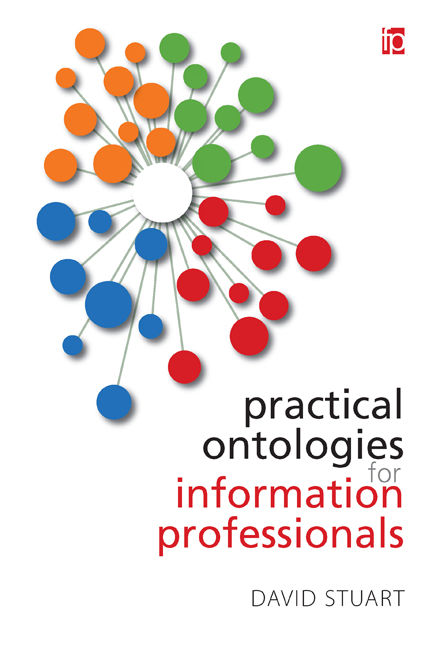7 - The future of ontologies and the information professional
Published online by Cambridge University Press: 09 June 2018
Summary
Introduction
In summarizing the law of the instrument Kaplan (1964, 28) wrote ‘Give a small boy a hammer, and he will find that everything he encounters needs pounding’ and such a law applies equally to the application of ontologies. By this stage of the book, if it has achieved its aim of demonstrating the value of ontologies, readers should see the potential of developing and applying ontologies in an ever-increasing number of situations in their working life and possibly even their personal life. This will, undoubtedly, include scenarios where other technologies may be more appropriate, or that the formality of the required ontology requires a skill level beyond that of the information professional.
This final chapter tries to reign in the sprawling potential of ontologies by considering the future of ontologies within the context of the original aims of this work, considering:
• the future of ontologies for knowledge discovery
• the future contribution of information professionals to the development of Ontologies
• the practical development of ontologies.
The adoption (or non-adoption) of any technology is not based on the intrinsic qualities of the technology alone, but is reflective of a wide variety of factors in the associated ecosystem, and the widespread adoption and development of ontologies, and the nature of these ontologies, will depend on competing technologies and culture as well as limitations of the ontologies themselves. Inevitably such a chapter raises more questions than it provides answers.
The future of ontologies for knowledge discovery
Within the information ecosystem ontologies must compete for territory with other alternative technologies and approaches, and the innate value of a technology does not necessarily lead to its domination. For example, the value of controlled vocabularies is well known amongst the community of information professionals, but controlled vocabularies are by no means the only or even the principal way that people retrieve information. For the majority of information enquiries, that is those typed by the average user into the search box of Google.com, the power of full-text indexing surpasses the value of controlled vocabularies. In much the same way, the power of formal structured ontologies and knowledge bases sit alongside the increasingly powerful natural language processing (NLP) tools that develop by brute force what could not be achieved through human efforts alone.
- Type
- Chapter
- Information
- Practical Ontologies for Information Professionals , pp. 155 - 164Publisher: FacetPrint publication year: 2016



